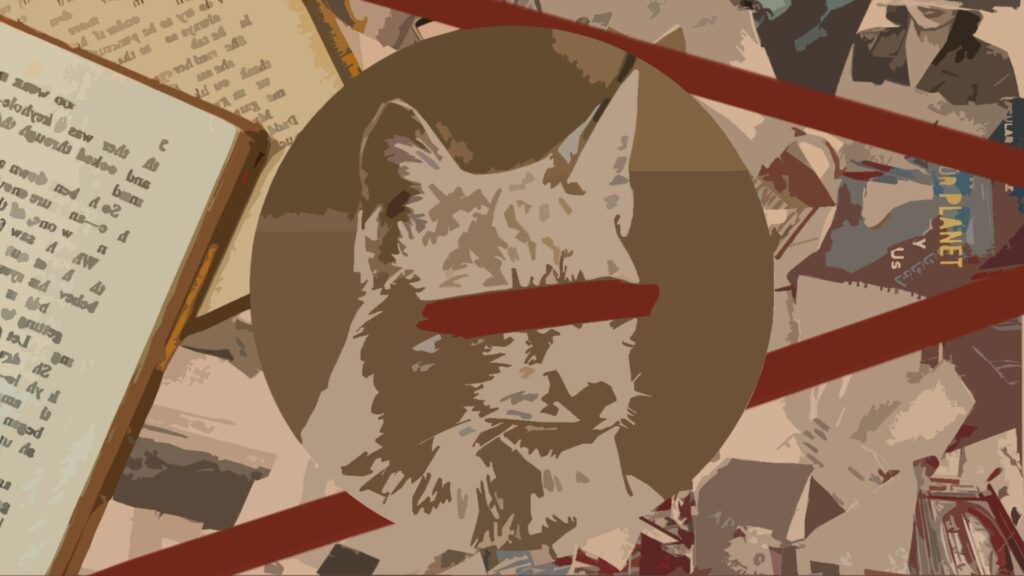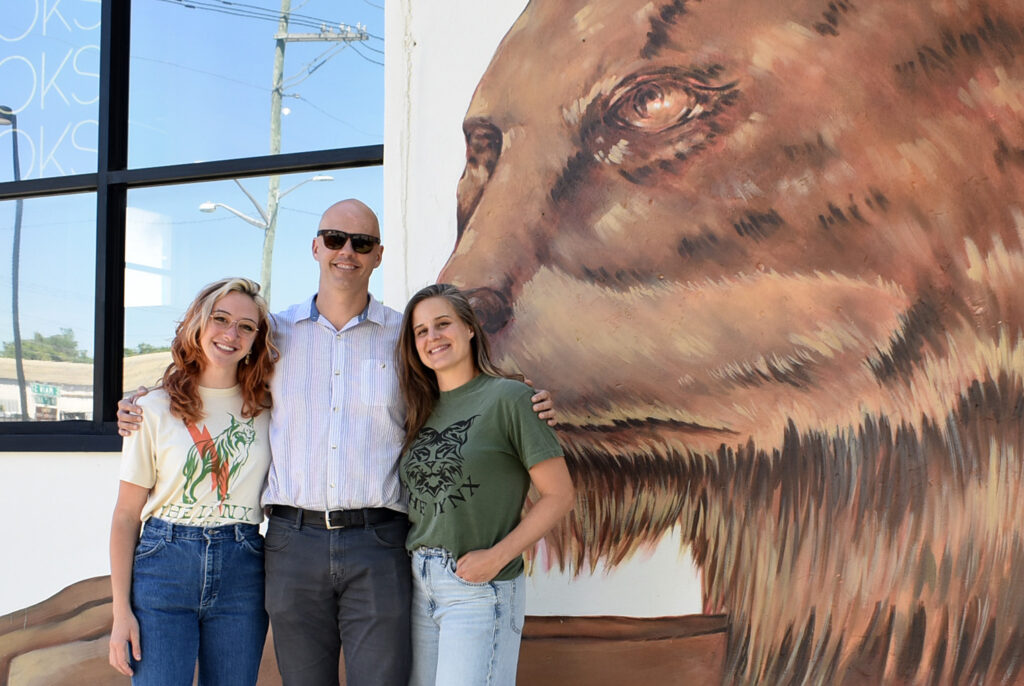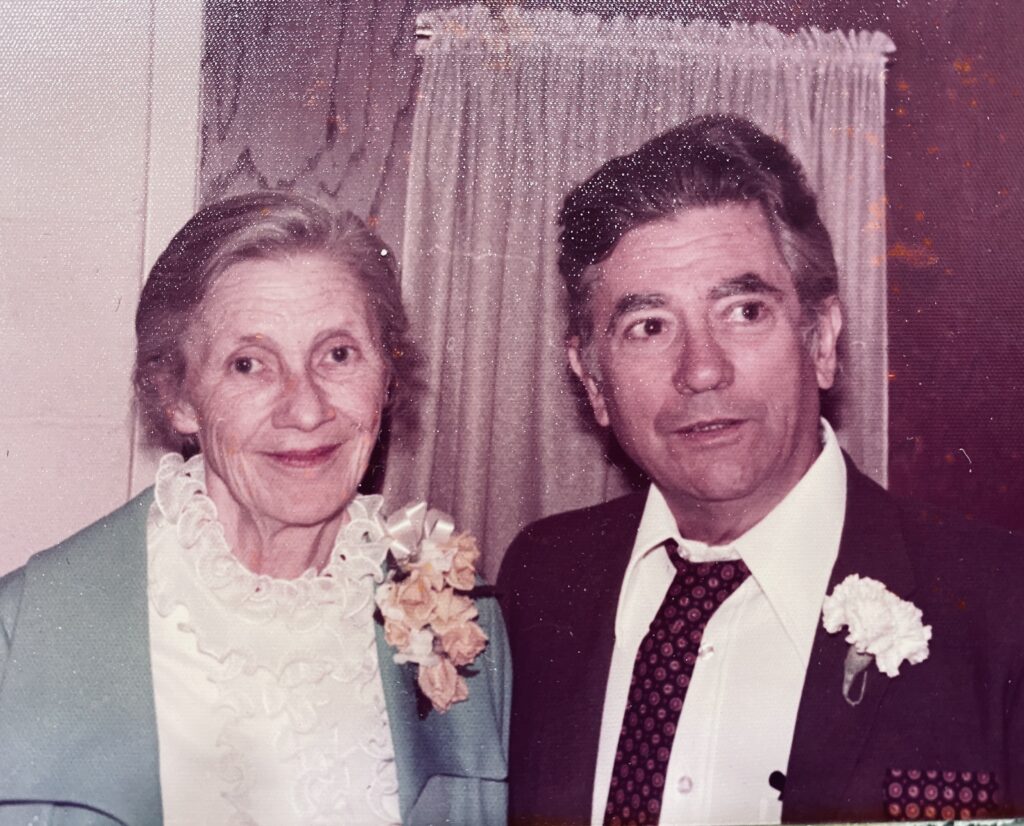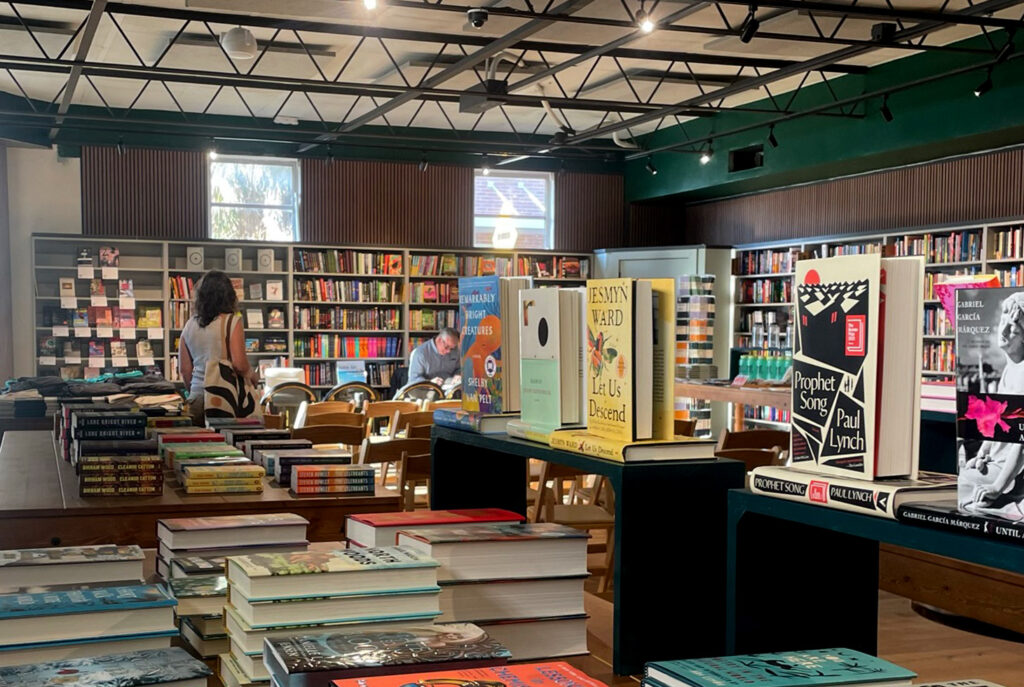A Gainesville bookstore connects readers amidst state book bans

April 25, 2024 | story and photos by Lauren Whiddon | Illustration by Matthew Cupelli
Driving home along 8th Avenue in Gainesville one night, Lauren Groff and Clay Kallman saw what looked like a giant house cat. It was about three times the size of a normal cat, with tufted ears and no tail. When they got home, they realized they had seen a lynx.
At the time, the couple had been trying to figure out whether their vision to bring an independent bookstore to Gainesville was possible. They’d found a space, but in Groff’s words, “it was a disaster. It was scary.”
They took the lynx as a sign. They saw their bookstore as a community link for Gainesville, as well as a link to efforts to fight book bans. And so, The Lynx was born. Groff and Kallman opened their 2,500-square-foot bookstore downtown at 601 South Main Street with a “soft launch” last week. They’ve scheduled a day-long grand opening with readings inside and outdoor events for Sunday April 28th.

Manager Gina Marks stands with owners Clay Kallman and Lauren Groff outside of The Lynx on Tuesday, April 23, 2024 in Gainesville, Florida.
Readers won’t have to look hard to find the store: A mural of a lynx covers the entire side of the building. The rust-colored wildcat lies in a regal pose, inviting but protective. Above it are the words “Watch us Bite Back.” The phrase is a nod to the word for a group of lynxes –a “watch” – and a metaphor for fighting back against what Groff, a nationally acclaimed author just named to Time’s list of the most influential people of 2024, calls “the slow authoritarian creep in our state.”
A new report from the free expression advocacy group PEN America found an “unprecedented surge” of book bans this school year, with Florida experiencing the highest number of bans at 3,135 across 11 school districts. Florida Gov. Ron DeSantis, who championed the parental rights legislation that swept in book removals, signed a bill last week amending state law to limit challenges from anyone without children in that district.
Beyond books banned by challenges, vague wording and harsh punishments in Florida laws that prohibit discussion of issues such as sexual orientation and systemic racism in the classroom have made it difficult for teachers and media specialists to know what’s legal, leading many schools to remove books from shelves before they are contested, according to PEN.
Such stories hit booklovers Groff and Kallman personally. Growing up in Cooperstown, New York, Groff spent time reading in a willow tree that had been struck by lightning, creating a platform she could climb up to read among branches overlooking a lake.
Today, she is a bestselling author and three-time National Book Award finalist for her short story collection “Florida” and her novels “Fates and Furies” and “Matrix.” Other books include “The Monsters of Templeton,” set in Cooperstown, and her most recent, “The Vaster Wilds.” Her career brought her to countless bookstores around the country. “You can never underestimate the amount of community that reverberates out of a bookstore,” she said.
She joins Judy Blume, Louise Erdrich, Emma Straub, Ann Patchett and others in a trend of author-owned local bookstores. “When I heard the news, I wanted to stop her. I wanted to praise her. I wanted to tell her there will be days that being both a writer and a bookstore owner will feel like one job too many,” Patchett wrote in Time’s most influential recognition of Groff.
In opening a Gainesville bookstore, Kallman, too, is following a tradition. His grandfather, Irving Kallman, came to the University of Florida on a track scholarship during the Great Depression. In an oral history, Irving Kallman described being so broke that the only way he could think to buy his meals was to sell “about a hundred books that I had accumulated.” He sold his “Complete Works of Shakespeare,” and his “Roget’s Thesaurus” as a start, and eventually rented a tiny store near campus to sell the rest. The Florida Bookstore endured for 83 years. Clay Kallman’s father took it over in the second generation, giving Clay his first job.

Elna and Irving Kallman, who owned the original Florida Bookstore in the 1930s.
A book is a conversation unlike any other, Kallman said of the family business. “You’re going deep into a story, into someone’s life or the history of a thing,” he said. “There’s nothing like that.”
Groff and Kallman met on the crew team at Amherst College. They settled in Gainesville in 2006, and thought about opening a bookstore for about 15 years, Groff said. But nothing ever panned out. Once state government began to suppress books, they knew it was time.
“It’s the beginning of a slippery slope into something really bad that we don’t want to happen,” Groff said. “So, we’re going to meet them in private business and celebrate the books that a lot of people don’t want to see given to children.”
Writers have a special obligation to speak out for the freedom of expression and the freedom to read, Groff said.
The store highlights LGBTQ+ and BIPOC stories and authors. It also has distinct Florida and nature sections. Its design was inspired by nature, which is something Groff loves about Florida, she said. The dark forest green walls and gold accents represent Gainesville’s trees and prairies.
Another foundation of Gainesville is its punk history, Groff said. “It’s very much a hippie town. It’s a countercultural town in a lot of ways,” she said. “So, it’s never sat right with Gainesville to have this oppressive authoritarian force keeping us from doing what we want to do.”
Still, the city is seeing plenty of books challenged in local schools by community members. More than 40 books have been challenged in local school libraries this academic year, according to the Alachua County district’s local count, including for “normalizing trans identities.”
Challengers “have the freedom to do that,” Groff said. “But we have the freedom to say no, to say actually, let’s celebrate books that will allow some children to see themselves reflected in the world – to allow some people to see that they are not alone in their lives.”
Once Groff and Kallman saw their live lynx and had their epiphany, the store Lynx came to life quickly, beginning with an Indiegogo crowdfund campaign launched in January that raised $116,000 from 1,500 backers by April.
Just a few weeks ago, the bookshelves, seven deep, were still empty. When the store hosted its first speaker April 16, the shelves were filled. Attendees came to hear historian Evan P. Bennett talk about his new book “Tampa Bay: The Story of an Estuary and Its People.” Some wore shirts that read “ban bigots not books” and “keep investing in libraries” in several languages.
The store was clean, organized and smelled lightly of wood. The west-facing windows streamed in light as the sun went down.
Along with classics, art books, romance, graphic novels and children’s books, the store has a shelf dedicated to the most frequently banned books, which include “The Bluest Eye” by Toni Morrison and “All Boys Aren’t Blue” by George M. Johnson.
Groff said she and Kallman hope “to one day be the Dolly Partons of Gainesville … who give away a hundred million books.”
They’re not prone to yell or impose anything on anyone. Mainly, they want to tell people that they are loved, Groff said. To her, their job is to get books into the hands of the people who need them.
“Being human is fundamentally lonely and when you read, you’re connecting with another human. You can connect to someone who was alive 300 years ago, I can connect with someone who I would never ever meet,” Groff said. “It’s just profoundly beautiful. It is the best technology humans have ever made. We’ll never make anything more beautiful than the book.”

An attendee walks around the inside of The Lynx while Evan P. Bennett signs a copy of his new book, “Tampa Bay: The Story of an Estuary and Its People” on Tuesday, April 16, 2024.